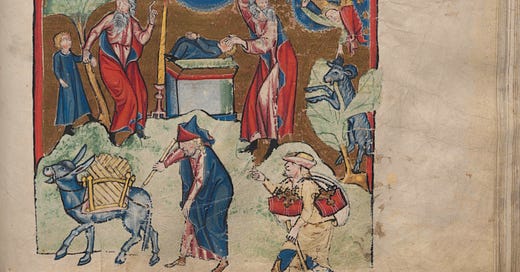I’ve been thinking a lot about our certainties. We cling to them and they comfort us. But when inquiry nudges those certainties into uncertainties, we often gain more than we lose.
What follows is a reworked summary of remarks I gave during Rosh Hashanah (Jewish New Year) services at a local chavurah (community prayer group) in Columbia, SC, where I live. I believe the themes are as resonant as they were six weeks ago— if not more so.
We think we know the stories, but the more we study them, the less we realize we know. I was asked to address Hagar and Ishmael— Abraham’s consort and child, respectively. It’s not the traditional reading for the first day of Rosh Hashanah, but our host believed it to be a necessary story for us all to confront, especially this year. It’s archetypal, mythical, emotional. The spiritual descendants of its protagonists still wage war around us today. And perhaps a first step towards some kind of reconciliation lies in the direction of curiosity rather than confidence.
The broad outlines of the story are familiar. God has told Abraham he’ll be the father of many nations, but he and his wife Sarah can’t have children. Sarah urges him to take up with her servant Hagar. He does, and they conceive Ishmael. Sarah becomes jealous, and expels Hagar and her son. God convinces Hagar to return to her harsh mistress. Later, by divine intervention, Sarah becomes pregnant with Isaac, and years later, not appreciating Ishmael’s aggressive style of play, she banishes Hagar and the boy once again, this time permanently. Ishmael grows up to be a bow hunter, and marries an Egyptian woman.
It’s the aftermath that is especially jarring. God tells Abraham to sacrifice his “son,” his “favored one,” “whom he loves.” We all know it’s Isaac, right?
A few days before Rosh Hashanah, when I was struggling with my sermon, my Sufi friend Taimoor came over for an impromptu dinner on the porch. As we were clearing plates I asked Taimoor about Hagar and Ishmael.
“Well,” he began, “you do realize in the Koran and later Islamic literature it’s Ishmael, not Isaac, who was nearly sacrificed?” I did not realize. My head spun. Taimoor scarcely had to tell me more— though of course he did, quoting Hadith, summarizing Sufi traditions, reciting Urdu poems that allude to the episode. As conversation with him often does, this stray remark and the revelation that approximately two billion Muslims believe it was Ishmael, not Isaac, sent me scurrying back to my own Jewish heritage, searching for traction. There was of course no mention of this “alternative” story. But I did find a spellbinding gloss on Abraham’s sacrifice in a very traditional source: the commentary of Rashi, a twelfth-century French scholar.
Rashi expands upon the monologic instructions God gives Abraham about sacrificing his son and converts the episode into a dialogue. When God instructs Abraham to sacrifice his “son,” Abraham answers him and says “which one? I have two?” When God specifies his “favored one,” Abraham replies “one is the favorite of his mother, and the other is the favorite of his mother.” When God adds “whom you love,” Abraham rejoins “I love both of them.” One can almost hear his frustration and confusion. It’s only when God gives him a fourth, final clarification— “Isaac” — that Abraham falls silent.
For us, the story is dramatic because the descendants of Abraham’s two sons are battling today in the Middle East. Isaac is the progenitor of Jews; Ishmael that of Muslims. We all know what’s going on in Gaza, in northern Israel, in southern Lebanon, in Tehran. This year has broken all of our hearts. Can healing begin from the story itself?
I’ve studied the Bible intensively for my entire adult life, yet I had never stopped to think about which of Abraham’s sons he was ordered to sacrifice, or why God’s instructions to Abraham take place in four seemingly redundant phases. This is because I was never curious about any tradition’s take on this tale other than my own. A quick exchange with Taimoor expanded my mind, and softened my certainties into slush. And Rashi’s imagination of a dialogue revealing Abraham’s struggle and confusion— the pain of a father who loves his two sons equally— melted my confidence away entirely.
Certainty about stories is the first step towards certainty about politics. And certainty allows no room for curiosity. If our Muslim brothers and sisters, who equally revere Abraham as a patriarch and prophet, and equally cherish the story of his willingness to sacrifice a child, understand the tale as one about Ishmael rather than Isaac, what else are we missing?
What more is there to learn about the traditions we share? Might there not be space to yield a bit in our positions, to loosen our certainties? And might not such an erosion of our entrenchments be a prerequisite to peace?
Our little devotional community in Columbia, SC, is remarkably diverse, embracing participants across the political spectrum. One member whose views are extremely liberal told the group she had never stopped to think about “the other side’s story.” And another member, solidly to the right, approached me with tears in his eyes and told me it was time to rethink some of his views. To soften his certainties.
I’m more convinced than ever, especially in these challenging times, that expanding our stories enlarges our hearts.






A revelation! Thank you:)